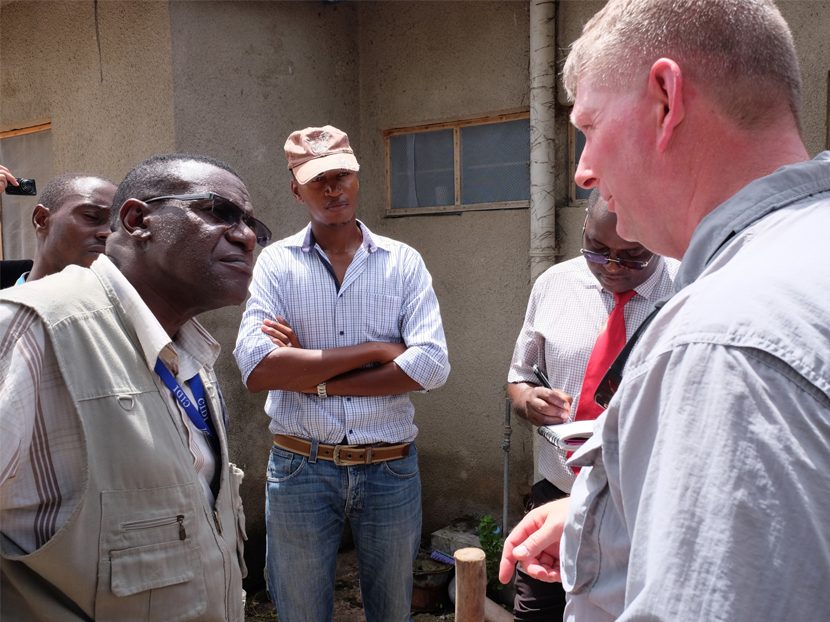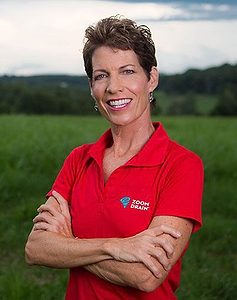World Solutions: What to Do About Waste?
FloHawks’ JR Inman is a man on a mission: to help provide proper sanitation across the globe.

I know JR Inman from the National Onsite Wastewater Recycling Association. We caught up recently and I asked what he is doing for “fun” these days. He described his work exploring worldwide solutions for handling septage (excrement and other waste material contained in or removed from a septic tank.) Wow. JR is a man on purpose. He inspired me and I am happy to share his story with you.
JR Inman is vice president of FloHawks Plumbing and Septic, headquartered in Puyallup, Washington. About seven years ago, he started working with a team of people who were creating new solutions to global sanitation problems.
“The team asked if we would be willing to do some equipment testing,” he explains. “We were intrigued and because we could do what they needed, we said, ‘Yes!’
“Now, I’m working with hundreds of people, from dozens of countries, to figure out how to handle septage better in developing countries — how to replace a commonly used system that takes four to six people doing manual labor. These people hand-shovel out a latrine, approximately 250 gallons, put it into buckets or containers and carry the septage to a tank or disposal location.
“When the team first approached me, I had a lot of useful experience: working in the septic industry for 40 years, plus 15 years of global travel, and double that teaching about waste and onsite treatment. The team asked if I would go to Africa and participate in an Omni Ingester workshop and weigh in from the operational side. I had been to Africa four to five times before and was eager to go and help.
“At the workshop, engineers, academics, manufacturers and operators from many other countries worked on ideas. We were in Durban, South Africa. We were instructed to take these sanitation problems and dream up potential solutions that could be put into real-life use.
“You know, during the event, they asked a stupid question. ‘Can this be done right now, with tools that already exist?’ And I said, ‘Yes.’ Everybody else in the room disagreed with me. However, they had prefaced the question by saying, ‘If money were not an issue, can this be done right now?’ Yes! You could bring in a Huey helicopter and dangle a half-a-million-dollar vacuum truck over these places. Then, someone could lower down the boom and vacuum everything up into the truck.
“They were looking for someone to confirm it was possible. They then asked us how we could shrink my idea into a real-life solution. In the United States, we can use a $500,000 truck and pull up next to the tank, pump it and transport it to a large waste treatment facility.
“Or we can build an onsite system to handle the waste. In many other places across the planet, that won’t work. The trucks are too big. The hoses and pumps are too big or won’t reach far enough. The roads are too small or nonexistent. And what do you do with the waste once you collect it?
“I see the world differently than an academic or an engineer. All my life, I have been solving septage problems that most of those people have never seen or heard of, or even thought about. At the end of the workshop, someone came up to me and said, ‘Thank-you for changing the way I think and how I do my job.’ I guess that’s what I was there for, to help the group see solutions instead of barriers. Ultimately, it must become financially feasible, too, but you have to start with a broader creative view.
“Now, it’s their job to design new tools, equipment and techniques. This involves smaller hoses and pumps. They are developing compact roadside tanks and treatment options. My part is to test it, even try to destroy it, by imitating the conditions found in the places these systems will be used.
No one-size-fits-all solution
“I donate some of my time to do this. It’s giving back to an industry that has paid me well, since 1982, when I started working in the waste industry. So, if my knowledge can be used and somebody else can develop it, I don't care if they make $1,000 or $10 billion. I hope we can make life better for a whole bunch of people.
“Because there are roughly 4 1/2 billion people on our planet who have inadequate sanitation systems; half of them have no sanitation system at all. More than a million children die each year because they don’t have access to clean water and proper sanitation.
“So, if money were no object, could we solve this problem? Is this problem solvable? I have to do what I can.
“Twenty years ago, they developed something called a pour flush latrine. And what they've learned is that in areas with those latrines, it is easier to serve and maintain the sanitation systems. It gives you some indication that it's possible to make a positive difference. There are other success stories, too.
“Still, the problems are complicated. There is no one-size-fits-all solution. I’ve been playing in waste/blackwater/biosolids since 1982. Around the world, it is different, depending on the culture of the country. For instance, in some countries, people wash and in others, they wipe. If they wipe, what do they use?
“Also, contraband, bottles, medications, trash, even bodies, can end up in the pit. The latrines are different, too. Some are made of plastic or concrete and some are holes in the ground. All this impacts what we can do as far as removing and treating the waste.
“Every day, we see the world that 350 million Americans live in. If you were to pick out the most desperate conditions in America, even for the homeless in some of our cities, we have a lot more to offer than in some developing countries.
“At my company, FloHawks, we strive to educate our team members and customers that the work we do is honorable and essential. While we have challenges in the United States, earning the respect we deserve, it is so much worse elsewhere. In some countries, the people who clean out the latrines and transport septage are considered the lowest of the low.
“What would our lives be like without the hard-working men and women who work in our trade, across the globe? I feel a responsibility to try to change this perception, here and abroad.
“I'm not sure I have a good message for your readers, other than, ‘Open your eyes.’ Recognize that when you have access to regular food, clean water, shelter and one set of clothing, everything else is extra. We are spoiled. We have it so good compared to two-thirds of the rest of the world. It's just crazy. And it affects me every day to think about it.”
Are you using your unique gifts, knowledge and passion to positively impact your community? I’d love to tell your story, too! Reach me at ellen.rohr@zoomdrain.com.
For additional information, visit these websites:
- FloHawks, www.flohawks.com
- World Health Organization sanitation facts, https://bit.ly/2FTqqRp
- Sustainable Sanitation and Water Management
- Toolbox/pour flush toilet, https://bit.ly/2XUFkj1
- Sustainable Sanitation and Water Management
- Toolbox/single ventilated improved pit, https://bit.ly/2Xy1OSI





